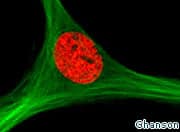Stem cell research that destroys human embryos is getting disproportionate funding because its controversial nature stirs up media hype, a scientist has warned.
Dr Colin McGuckin says funding for the ethical alternative – adult stem cell research – is being hampered by a lack of publicity.
Adult stem cell research doesn’t involve the destruction of human embryos. Instead it gathers stem cells from sources such as bone marrow, umbilical cord blood, and the nasal cavity.
Destructive
Despite the lack of publicity adult stem cell research has already led to over 100 treatments and clinical trials.
But embryonic stem cell (ESC) research has yet to produce any successful treatments, and some nations even ban the work because of its destructive nature.
Dr McGuckin, speaking at a conference held by an Irish pro-life goup, warned that the controversial nature of ESC research gives it a disproportionate amount of attention in the media, making the situation more difficult for those seeking funding for more ethical alternatives.
Controversial
Dr McGuckin, director of the Cell Therapy Research Institute in France, said: “People aren’t talking about cord blood because it’s not controversial”.
He added: “Consequently, it does not make headlines and therefore researchers who want to use the cells from cord blood do not receive funding. It’s a vicious cycle.
“If cord blood were controversial people would be talking about it seriously at government level. But because people aren’t writing in and giving their ministers a hard time, no one [in government] is talking about it.”
Humanity
Despite the limited success of ESC research Dr McGuckin predicts that universities and researchers will continue to push for more funding for another decade.
He added: “When we were at university people told us that if you want to be a good scientist you have to come up with a novel thought and it will be peer-reviewed by all your peers, and you will try to do the right thing for humanity if you’re going to do medical research.
“It used to be that you’d be peer-reviewed and the best proposal for a fund would go forward and get the money.”
Culture
Dr McGuckin added: “The whole world has moved toward a celebrity culture. Now if you’re pitted for a Nobel Prize, you’re going to get any fund you can think of. And it doesn’t matter whether it’s rubbish work or not; no one is going to dare to reject it.”
Last month it was revealed that scientists had discovered a “remarkably efficient” way to manufacture stem cells which closely resembled their embryonic equivalent.
Researchers at the Harvard Stem Cell Institute found a new, safer and more ethical way to reprogram ordinary skin cells into stem cells, known as induced pluripotent stem (iPS) cells, which appear to be almost indistinguishable from embryonic stem cells.
Exciting
The iPS cells can then be used to manufacture specific types of cells.
The development, which was revealed in a stem cell journal, was welcomed by the scientific community.
Derrick J. Rossi, who led the research, said: “This is going to be very exciting to the research community”.
Clinically
“We now have an experimental paradigm for generating patient-specific cells highly efficiently and safely and also taking those cells to clinically useful cell types.”
Robert Lanza, a stem cell researcher at biotechnology company Advanced Cell Technology, said: “All I can say is ‘wow’ – this is a game changer”.


